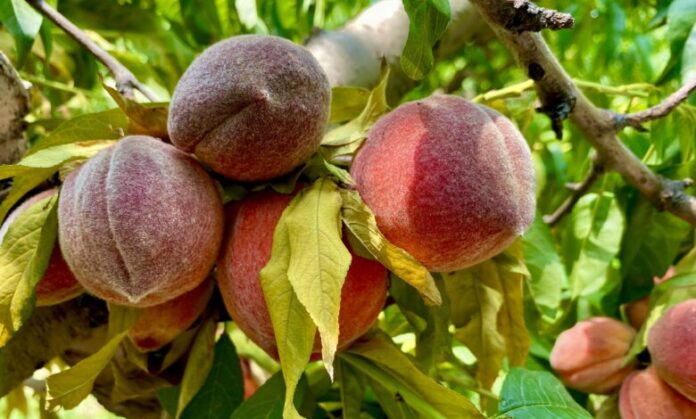
Shehzad Naveed
Swat, a picturesque district in Khyber Pakhtunkhwa, has borne witness to the irreversible devastation of its peach crops, owing to the relentless onslaught of climate change and devastating rain and hailstorms. Last year, floods wiped away trees and fields, and this year, relentless rains and heavy hailstorms wreaked havoc on crops.
Farmers lament that, despite the promise of a bountiful peach harvest this year, the fruit on the trees remains inedible. Swat accounts for a substantial 80% of Pakistan’s peach production, and due to the devastating impact of hailstorms, peaches will be scarce in the market this season.
Swat’s peaches are adored throughout the country, particularly by individuals, including diabetics, who relish these delicious fruits. Two years ago, the region yielded an impressive 400,000 kg of peaches. However, this year, the relentless climate changes, accompanied by stormy rains and hailstorms, are expected to severely curtail production.
Also Read: Swat Mother Alleges Sons’ Disappearance Following Alleged Police Torture
The district is home to 15,000 hectares of peach orchards, which yield thousands of tons of peaches for the market. Swat cultivates over a dozen varieties of peaches, with the top eight being exceptionally popular. While most orchards yield these varieties, this year’s weather has proven to be detrimental.
Abd al-Bathir, who has dedicated three decades to the peach business, explained that despite the favorable climate in Swat, peach farmers are grappling with difficulties. The storms and hail have severely impacted the peaches, diminishing their flavor and size, thus affecting production.
Furthermore, Abd al-Badhir highlighted that after thirty years of cultivating peaches, it has become unprofitable, given the high costs and low income. Farmers have received no government relief or packages to alleviate their financial burdens, and they are left to bear the costs of packing, loading, and labor themselves.
Farmers across Swat have expressed their apprehension about the feasibility of continuing this business. There is also a looming fear that Pakistan may soon lose its beloved peaches.
Peaches from Swat are dispatched to various regions across the country, but their shelf life is limited to just five to seven days. Despite lower production, this year’s market prices for peaches are notably lower compared to the previous year.
Environmentalists, including Akbar Zeib, stress that the government must take proactive measures to safeguard the cultivation of Swat’s renowned, delectable peaches. These efforts are essential to prevent the extinction of this cherished fruit and to ensure that the people of Pakistan can continue to enjoy this unique gift.
The adverse effects of climate change are manifold, encompassing the increased frequency of extreme weather events, rising sea levels, disruption of rainfall patterns, and the melting of polar and mountain ice. Pakistan ranks seventh among the countries most affected by climate change, having experienced 139 natural disasters over the last two decades.






